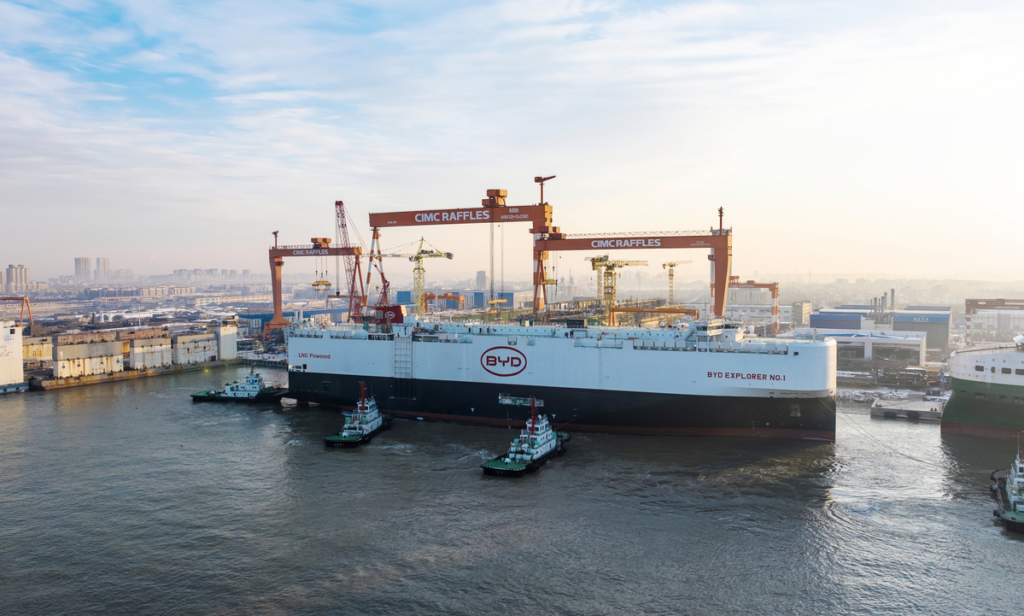
China’s EV expansion in Brazil is facing mounting challenges as domestic automakers push for higher tariffs to counter the influx of low-cost Chinese vehicles. BYD, which has captured 47% of Brazil’s EV market, has stockpiled over 70,000 unsold vehicles in ports, anticipating tariff hikes. Brazil reinstated import duties in January 2024, starting at 10% and rising to 35% by mid-2026. Despite BYD’s dominance, local manufacturers, including Volkswagen and Toyota, are ramping up EV production.
With Chinese automakers controlling 90% of Brazil’s EV market, policymakers face pressure to accelerate tariff increases. The outcome could reshape global trade policies.
BYD has rapidly expanded its presence in Brazil since entering the market in 2021, leveraging aggressive pricing strategies to offer electric vehicles at significantly lower costs than competitors. The company’s entry-level model is priced at 115,800 Brazilian Real ($19,100), making it more affordable than many gasoline-powered alternatives.
This approach has enabled BYD to capture a substantial share of Brazil’s growing EV market, but it has also raised concerns among domestic automakers and policymakers about fair competition.
Brazil initially exempted EVs and hybrids from a 35% import tax to encourage adoption. However, as Chinese manufacturers flooded the market, the Brazilian government reinstated tariffs in January 2023, starting at 10% and set to rise to 35% by mid-2026.
This decision was largely driven by pressure from local automakers, who argued that Chinese companies were engaging in product dumping—selling vehicles at artificially low prices to dominate the market.
With more than 70,000 unsold Chinese EVs clogging Brazilian ports, policymakers face increasing pressure to accelerate tariff hikes and ensure a level playing field for domestic manufacturers.
The impact of BYD’s expansion strategy is evident in Brazil’s ports, which are currently overwhelmed with more than 70,000 unsold Chinese electric vehicles. To circumvent rising tariffs, Chinese manufacturers rushed to deliver vehicles before the new import duties took effect.
- Lukaku becomes the most expensive player ever
- Church should lead vaccination programme
- Lukaku becomes the most expensive player ever
- Church should lead vaccination programme
Keep Reading
A recent shipment of over 7,000 BYD vehicles left China’s Jiangsu province in late April, expected to arrive at the Port of Itajaí in Santa Catarina by May. This influx has led to logistical bottlenecks, with thousands of vehicles sitting idle, awaiting distribution.
BYD’s stockpiling strategy has drawn criticism from competitors, who argue that it creates an unfair advantage. Domestic manufacturers, including subsidiaries of global giants like Volkswagen, General Motors, and Toyota, have ramped up their electric vehicle offerings and investments to counter the Chinese influx.
However, they contend that without stricter tariffs, BYD and other Chinese brands will continue to dominate the sector, making it difficult for local players to compete. Brazil’s government has reinstated import tariffs, starting at 10 percent and set to rise to 35 percent by mid-2026, in response to growing concerns over market saturation and fair competition.
Brazil’s government is facing increasing pressure to accelerate tariff hikes and introduce additional regulatory measures to ensure fair competition in the electric vehicle market. Alexander Seitz, executive chairman of Volkswagen South America, recently stated that the honeymoon period for Chinese automakers in Brazil is over, signalling a shift in industry sentiment.
Domestic manufacturers are urging policymakers to immediately enforce the 35 percent tariff rather than gradually increasing it over the next two years, arguing that delayed implementation could allow Chinese companies to further dominate the market.
Despite these challenges, BYD remains committed to its expansion in Brazil. The company is projected to exceed 100 billion dollars in global sales this year, with Brazil playing a crucial role as its largest international market.
BYD executives argue that their pricing strategy is necessary to make electric vehicles more accessible and accelerate Brazil’s transition to sustainable transportation. Alexandre Baldy, BYD Brazil’s senior vice president, defended the company’s approach, stating that it helps maintain competitive pricing while addressing what he described as an outdated domestic industry.
As tensions rise, Brazil’s response could shape the future of its EV market and influence global trade policies.
Brazil’s handling of the Chinese EV influx could set a precedent for other nations grappling with similar challenges. As major economies, including the United States and European Union, adopt protectionist measures against Chinese imports, Brazil’s response will be closely watched.
If the country successfully implements stricter tariffs and regulatory controls, it could influence global trade policies and reshape the competitive landscape of the EV industry.
Moreover, the cooling demand for EVs in Brazil reflects a broader global trend. While initial adoption rates were high, market saturation and economic uncertainties have slowed growth. This shift raises questions about the long-term viability of aggressive expansion strategies like BYD’s and whether other Chinese automakers will face similar resistance in new markets.
China’s EV expansion in Brazil, led by BYD, is facing mounting obstacles as domestic and international automakers push for higher tariffs to counter product dumping. With 70,000 unsold Chinese EVs clogging Brazilian ports, the debate over fair competition and market regulation is intensifying.
Brazilian manufacturers argue that low-cost Chinese imports threaten local industry, prompting calls for immediate tariff hikes. As Brazil navigates these challenges, its decisions could have far-reaching implications for global trade policies and the future of the EV industry.







